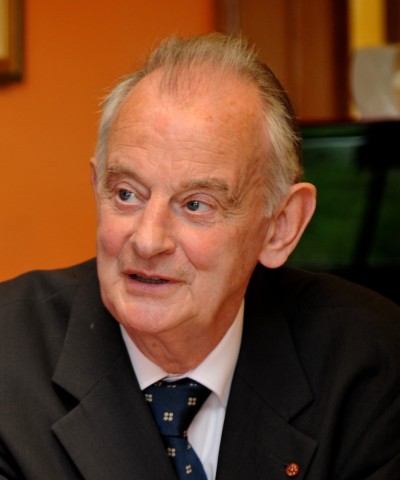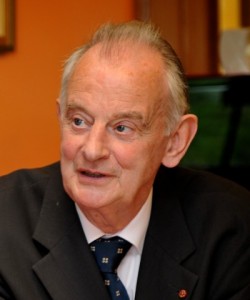The Freedom of the City is to be conferred on Foyle Hospice founder Dr Tom McGinley this week.
The decision to present the honour to the former GP was taken at a special meeting of Derry City Council in September last and has received widespread approval throughout the North West and beyond.
Dr Tom McGinley becomes the first person to receive the honour since Nobel Laureate John Hume in 2000.
He will receive the Freedom of the City at a special council meeting to be held in the Guildhall at 7.00pm this Wednesday 4 September. The ceremony will be followed a by civic reception hosted by the Mayor and a celebratory dinner.
Mayor Martin Reilly said he was delighted the important role played by Dr McGinley through the Foyle Hospice was being recognised by him receiving the Freedom of the City.
Mayor Reilly said: “Dr Tom McGinley has over the years made a huge contribution to the lives of many people in this city across the wider North West area.
“The establishment of the Foyle Hospice and his contribution to patients with cancer and other illnesses and their families has been phenomenal and I think it is a fitting tribute to him that he has been honoured in this way.
“I would like to extend my congratulations to him on behalf of the people of the city.”
The idea for a hospice began back in 1984 when New York born and Donegal raised Dr McGinley, a practicing GP in Derry, was treating an 18 year-old boy with terminal cancer.
Set in picturesque surroundings on the city’s Culmore Road, the Hospice has provided free care for countless patients since it opened back in 1991 and since then has played a key role in the city’s health infrastructure as well as helping countless families at a time when they need it most.
Dr. McGinley’s work with the hospice has already seen him awarded a Papal Knighthood by Pope John Paul II.
He has dedicated his Freedom of the City award to the people of Derry.
He said he was honoured to accept the Freedom of the City and would accept the award in recognition of the support the Hospice had received by the local community.
Among those who have congratulated Dr McGinley is retired Bishop of Derry, Most Rev Dr Edward Daly, who has visited the facility almost every day during the past 20 years.
Describing Dr McGinley as “visionary,” Dr Daly said Derry and the wider community owed him a “huge debt of gratitude.”
Dr Daly added: “I could not image Derry without the Hospice and the community has responded to the initiative with.”
He concluded: “Every time I visit I am still filled with awe at the work that goes on there.”
Born in Brooklyn, New York, Tom McGinley’s family returned to West Donegal a few years after because there was no work in the US.
After attending secondary school in Letterkenny he went to university to study medicine.
After moving to Derry around 1960, he spent several years at the hospital before moving into general practice.
He soon became deeply unhappy with the standard of care given to dying people but it was his encounter with the terminally ill 18-year-old cancer patient and his inability to administer effective pain relief or talk to him about dying and death that provided the trigger for what was to become a life-long interest in caring for the terminally ill.
After visiting St Joseph’s Hospice, Hackney in London for a few weeks each year, he decided anaesthetics might be the way forward into providing pain relief so, at the same time as continuing in general practice, he worked towards obtaining a fellowship in anaesthetics.
He was then offered a consultancy position but felt that if he was ever to be involved in hospice care it was better to remain in general practice during which he dedicated his spare to to fulfilling his ambition.
Today, costs in the region of £2.3 million to maintain the Hospice’s services, all of which are free to patients and their families.
Receiving less than 19% funding from the Western Health and Social Care Trust, the Hospice is dependent on the support of individuals, companies and Trusts to maintain its services and to continue to offer them free of charge.
The commitment of its 370 strong volunteer community enables the Hospice to offer a high level and diverse service.
The Hospice provides ongoing palliative care services for patients with cancer and other life limiting illnesses while supporting their families and loved ones in the North West.
Its care is based on a philosophy which recognises the need to treat each person with dignity, respect and compassion irrespective of their cultural or religous background.
Its vision is that all adults in the local community living with life-limiting illnesses will have access to the best possible palliative care that is appropriate to their needs.
The Hospice aims are:
:: to provide the highest levels of support and care to its patients and help them to retain independence and control of as many aspects of their care and life as possible.
:: share truthful information about diagnosis, treatment and prognosis with a patient in a sensitive manner.
:: support families and loved ones to help them cope during the illness and in bereavement in an attentive and non-intrusive manner.
:: co-operate and collaborate with other professionals and support agencies, in particular the Primary Health Care Team and hospitals.
:: make decisions about treatment and care in conjunction with members of a multi-disciplinary team and in line with a patient’s personal goals and preferences.
:: be an excellent and rewarding place to work.
:: support and value our volunteers.
Tags:






